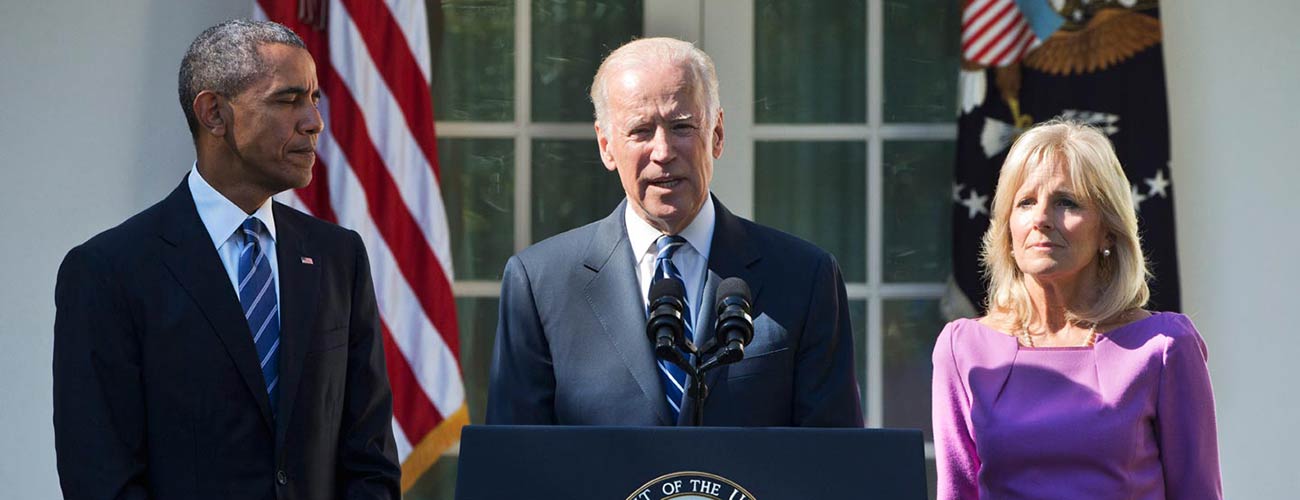For a glance into the hyper-competitive arena of digital campaign coverage, keep this week’s folly in mind. On Monday night, The Washington Post reported that Vice President Joe Biden would end months of speculation and jump into the Democratic primary contest, “according to XXX sources.” The story was pre-written should Biden announce, complete with analysis and prediction about the road ahead. As an editor’s note now states, “This file was inadvertently published.” Post reporter Paul Kane apologized on Twitter for the accident.
Finally, to be clear, we don’t know if it’s a yes or a no. Full disclosure: I have a he-says-no-story also written. 3/3
— Paul Kane (@pkcapitol) October 20, 2015
The screwup was perhaps a fitting exclamation point to months of breathtaking will-he-or-won’t-he media coverage, much of it effectively drawn from “XXX sources.” Standing beside President Obama in the White House Rose Garden on Wednesday, Biden told a ravenous Washington press corps that the window for his potential campaign had closed.
The ensuing criticisms leveled across various platforms could also have been pre-written: “How The Media Blew The Biden Story”; “How the media fell into the Biden trap”; “Here Are The People Who Got Biden 2016 Totally Wrong.” “Honestly, what we did all know is that if we waited long enough, Joe Biden would tell us — he would either get in or he would not, and then we would know,” MSNBC’s Rachel Maddow said Wednesday night. “There’s no reason to make it up before then.”
It’s a fair point, though also one more difficult to make for political journalists without self-named cable news programs. Reporters on the campaign trail don’t boast the luxury of “waiting long enough.” Their job is to break news, and the social-driven digital media environment incentivizes them to publish any new bit of information they hear. This market for “micro-scoops” inherently pushes journalists toward hearsay, a pressure of which most on the campaign trail are keenly aware, if complicit in perpetuating. And to many news organizations’ credit, they couched reports of Biden’s thought process with cautious language or qualifiers when possible.
The vice president’s supporters certainly had an interest in ginning up media coverage, and some storylines clearly came with their fingerprints attached. As trial balloons floated by confidantes, or Biden himself. Attention from the press, some political scientists argue, in fact causes candidates to rise in the polls. Such an early bump would be all the more important in a primary contest against the vaunted Hillary Clinton campaign.
But there’s also a simpler factor at play, one that directly affected media coverage: Between undoubtedly endless meetings with political counterparts, interest groups, aides and advisers, and friends and family, Biden couldn’t make up his mind. Which is to say, the news reports might have been right at the time–now he’s in, now he’s out.
The former Senate veteran long dreamed of reaching the Oval Office, though he’s also grappled publicly with the recent death of his son, Beau Biden. “The [grieving] process doesn’t respect or much care about things like filing deadlines or debates and primaries and caucuses,” the vice president said Wednesday.
“If only there were a way to play with the idea that Biden is taking a long time to decide.” — bad headline writer
— Ryan Lizza (@RyanLizza) October 19, 2015
Those internal deliberations came in addition to a general lack of organization among Biden and his potential supporters. As Politico Chief Political Correspondent Glenn Thrush, who wrote a lengthy profile of the vice president last year, said on Slate’s Podcast for America! this week, “Joe Biden is not strategy.”
“Joe Biden is whatever the hell Joe Biden is,” Thrush said. “The guy is very emotional, very connected with his own legacy, and, I think, very indecisive, as I think the last couple of weeks have shown.”
Evaluated against Biden’s final decision, the media was indeed wrong. Evaluated against Biden’s own emotional and organizational rollercoaster, the media was along for the ride.
David Uberti is a writer in New York. He was previously a media reporter for Gizmodo Media Group and a staff writer for CJR. Follow him on Twitter @DavidUberti.

